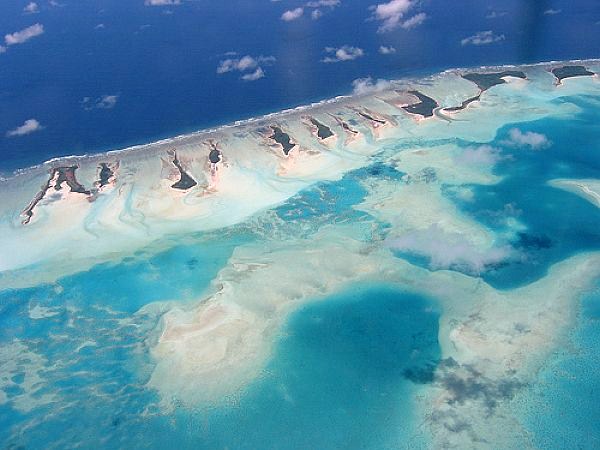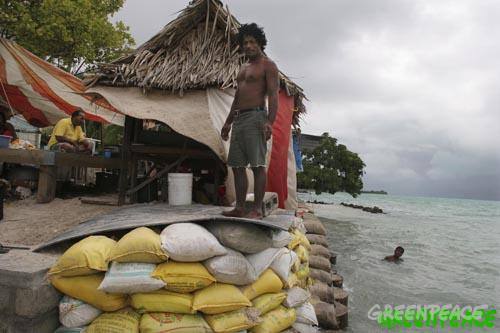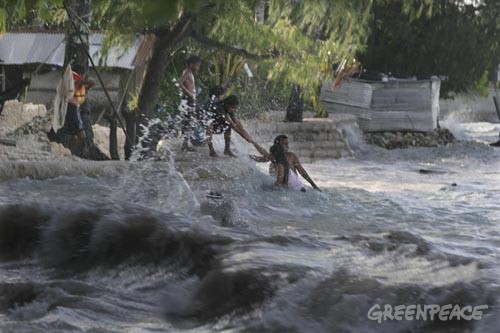Rising waters in Kiribati threatening villages

An increasing number of coastal villagers are asking to be relocated because of rising sea waters in Kiribati. Kiribati is in urgent need of funding to build sea walls to prevent sea water destroying villages and crops.

If more funding is not forthcoming in the near future, the government will have a much bigger problem on its hands. Sea waters are rising faster than the nation can cope. One part of the government’s strategy is to look at ways to relocate i-Kiribati, both within and outside the country. President Tong says the concept of ‘climate refugees’ is too controversial for the international community to realistically consider. He says the government is trying to facilitate ways for its people to migrate on the basis of the skills they can offer a new country, rather than the urgency of their need to relocate. (AustraliaNetworkNews)

Kiribati has been facing rising waters by as much as 5 mm per year since 1991. This phenomenon has also been causing the high salinization of its fresh water. Global warming is being blamed for what has been happening to the island nation that is one of the lowest spots on earth, found between Hawaii and Fiji.
According to environmental researchers that have been studying the situation of Kiribati, the problem of global warming is not so much the rising waters as the death of corals. Ocean acidification caused by emissions of greenhouse gases is fatal to coral reefs that have already been weakened by destructive fishing practices such as massive catches of grouper, a species that plays a crucial role in the balance of the coral reef. Researchers note that if there is more coral, there are more islands.

As the seas continue to rise, the 92,000 people who live there could be forced to emigrate, together with tens of millions of other people in low-lying island and coastal communities around the globe.The pollution which causes global warming has reached dangerous levels and scientists have warned that low-lying islands face permanent inundation from rising seas. To save coastal communities and islands like Kiribati, governments must act to penalise polluters and invest heavily in clean energy sources in order to reduce emissions. (GreenPeace)
Kiribati islands plan exodus faced with rising sea levels (OpenDemocracy)
Kiribati: Rising Sea Level Submerging Island Nation (TrendsUpDates)
Sea wall no option for some Kiribati islands (ANN)
King tide pummels Kiribati (GreenPeace)
Kiribati hopes to save vulnerable coastlines from erosion (ANN)

While the Earth has always endured natural climate change variability, we are now facing the possibility of irreversible climate change in the near future. The increase of greenhouse gases in the Earth?s atmosphere from industrial processes has enhanced the natural greenhouse effect. This in turn has accentuated the greenhouse ?trap? effect, causing greenhouse gases to form a blanket around the Earth, inhibiting the sun?s heat from leaving the outer atmosphere. This increase of greenhouse gases is causing an additional warming of the Earth?s surface and atmosphere. A direct consequence of this is sea-level rise expansion, which is primarily due to the thermal expansion of oceans (water expands when heated), inducing the melting of ice sheets as global surface temperature increases.
Forecasts for climate change by the 2,000 scientists on the United Nations Intergovernmental Panel on Climate Change (IPCC) project a rise in the global average surface temperature by 1.4 to 5.8°C from 1990 to 2100. This will result in a global mean sea level rise by an average of 5 mm per year over the next 100 years. Consequently, human-induced climate change will have ?deleterious effects? on ecosystems, socio-economic systems and human welfare.
At the moment, especially high risks associated with the rise of the oceans are having a particular impact on the two archipelagic states of Western Polynesia: Tuvalu and Kiribati. According to UN forecasts, they may be completely inundated by the rising waters of the Pacific by 2050.
According to the vast majority of scientific investigations, warming waters and the melting of polar and high-elevation ice worldwide will steadily raise sea levels. This will likely drive people off islands first by spoiling the fresh groundwater, which will kill most land plants and leave no potable water for humans and their livestock. Low-lying island states like Kiribati, Tuvalu, the Marshall Islands and the Maldives are the most prominent nations threatened in this way.
“The biggest challenge is to preserve their nationality without a territory,” said Bogumil Terminski from Geneva. The best solution is continue to recognize deterritorialized states as a normal states in public international law. The case of Kiribati and other small island states is a particularly clear call to action for more secure countries to respond to the situations facing these ‘most vulnerable nations’, as climate change increasingly impacts upon their lives.